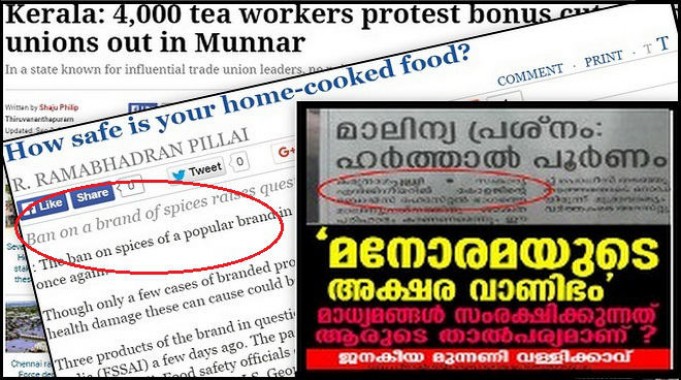Reporting or covering up?
The Hindu (left) omits the name of the brand, the Malayala Manorama (right) omits the name of the college.
For the Kerala media, which always takes pride in being rooted in the land of 100 per cent literate people, boasting about themselves to advertisers is nothing new. They always claim to be the 'best' in covering each and every happening in the state. Unfortunately though, the mainstream media’s recent track record reveals a seamy side – a notorious inclination to cover up everything.
In Malayalam, the mainstream media is called Mukhyadhara Madhyamangal. Readers equipped with online power have renamed it Mukkiyadhara Madhyamangal, which means cover-up or hush-up media as mukhya and mukkiya sound somewhat the same in pronunciation.
Why this tag? Well, whether it is news of Kerala’s Atlas Jewellery owner being taken into custody for financial crimes in Dubai or young bureaucrat T.V. Anupama banning certain products of Nirapara, a curry powder brand, for alleged adulteration, the mainstream media have ignored these stories or played them down.
According to the notice sent by Anupama to Nirapara, the curry powder maker was repeatedly adulterating his products with substances such as starch for the purpose of making huge profits. Yet this story not covered at all, or barely.
Coverage of the Atlas Jewellery news was delayed despite the fact that it was all over social media after an August 27 report in Gulf News which was followed by reports in the Khaleej Times, the Deccan Chronicle and Reuters. Later, after three days, Malayala Manorama, the Times of India and many others published stories but even so, The Deepika from Kottayam in Kerala called Atlas 'a Dubai-based jeweller'.
The print media also initially ignored the protests of around 3500 tea plantation workers in Munnar who worked at Kanan Devan Hills Plantations Company. The strike began on Sept 4, but for the first three days, the Malayalam papers ignored it or played it down. On the third day when Reporter TV, a Malayalam news channel, came out with minute by minute updates, it became a news story for other TV channels. The Indian Express, The Hindu, and Deccan Chronicle reported the story on Sept 8.
In the latest example of dereliction of duty, the media kept quiet about protests against environmental pollution by villagers in Kollam district. The strike was held under the banner Janakeeya Munnani (Peoples Front) and was against an engineering college run by Mata Amritanandamayi Mutt releasing sewage water into the village. The protests were angry and led to arrests, with some participants declaring a hunger strike.
Nor was it a brief flare-up. The protest lasted six days and ended only on Monday when the Mutt agreed to the demands of protestors in front of Kollam district government officials. The Mutt has agreed remove the sewage by November 23, stop releasing sewage into the village, and build a new plant in 18 months.
But as Mata Amritanandamayi is revered as the demi-goddess of God’s Own Country, none of the mainstream media reported the strike which was attended not just by men but women and children too. Even when the protests were feebly covered as a small story by Malayala Manorama, the reporter omitted to mention the name of the college and its management.
However, Deshabhimani, the vernacular news daily owned by the CPI (M) and Madhyamam, the vernacular daily run by the Jamaat e-Islami group, did run the story.
Last month, The Hindu did something similar with the Nirapara food adulteration follow-up story. The story ‘How safe is your home-cooked food?’ didn’t name Nirapara at all. The issue was skirted with the use of circumlocutions such as ‘a popular brand’, ‘the brand in question’, ‘the manufacturer’, ‘the company’, and ‘another Kerala-based company’.
Online portals like One India Malayalam, Marunadan Malayali and Malayali Vartha, however, were abuzz with the news, their readers venting their anger at the mainstream media for 'covering up' the news about Nirapara’s alleged adulteration.
People in Kerala have started to lash out at this selective reporting by the media. This week, protestors burnt copies of Malayala Manorama, Mathrubhumi and Kerala Kaumudi in Vallikavu in Kollam district where the People's Front had been demonstrating against the release of sewage.
REJIMON K is a senior reporter at the Times of Oman







